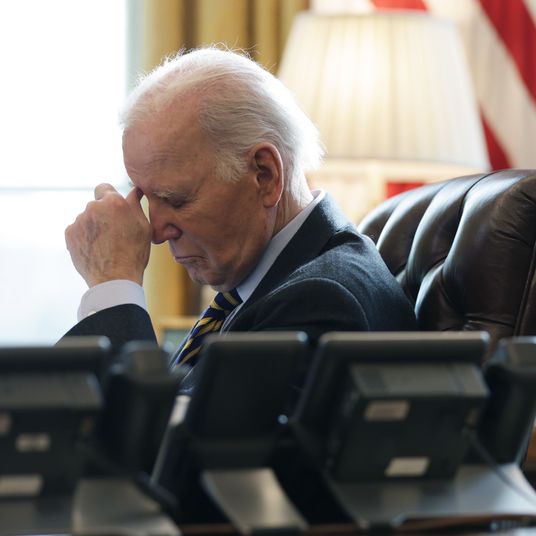
It is hard to exaggerate the psychological boost Democrats derived from Joe Biden’s 2024 State of the Union Address. Fears that Biden would show his advanced age on the reelection campaign trail — or worse yet, hide from voters — were dissipated by his fiery upbeat demeanor and extemporaneous feistiness. His team’s strategy for winning in November was on full display as the president chipped away at public skepticism about his record and identified Republicans with deeply unpopular policy positions and their deeply unpopular nominee. After the satisfying main course of Biden’s address, dessert was served to Democrats via Katie Britt’s weird and mendacious Republican response, which was unintentional comedy gold.
But while the State of the Union did wonders for Democratic optimism, there’s simply not much evidence that it changed many minds about Joe Biden’s job performance or flipped many votes from Republican to Democrat.
The president’s job-approval ratings remain subpar. In the RealClearPolitics polling averages, Biden had a 39.2 percent approval rating on March 7 and a 39.8 percent rating eight days later. In the FiveThirtyEight polling averages, Biden’s approval actually dropped slightly from 38.1 percent on March 7 to 38.4 now. One pollster (Economist/YouGov) who measured presidential job approval just before and a few days after the speech showed almost no change (a 42 percent to 56 percent approval/disapproval ratio on March 3–5, and a 42 percent to 55 percent ratio on March 10–12).
Even if Biden didn’t lift assessments of his job performance in this one speech, did he at least damage perceptions of Trump? There’s not much publicly available evidence of that either. Yes, a post–State of the Union poll from ABC/Ipsos gave Trump a terrible 29 percent to 59 percent favorable/unfavorable ratio, but it also gave Biden a nearly-as-terrible 33 percent to 54 percent ratio. Other post–State of the Union polls provided better favorability ratios for both candidates, but they were largely identical (the USA Today/Suffolk favorability/unfavorability poll has Biden at 41 percent to 55 percent and Trump at 40 percent to 55 percent; a similar Economist/YouGov favorability poll has Biden’s at 45 percent to 53 percent, and Trump at 46 percent to 53 percent).
The State of the Union address, despite Biden’s combo platter of self-promotion and attacks on “my predecessor,” also had no palpable impact on general-election polling. In head-to-head matchups with Trump, the RCP averages showed Trump leading Biden by 1.8 percent on March 7 and by 2.4 percent today. Specific pollsters found no national pro-Biden bounce: Economist/YouGov had identical Biden/Trump numbers (a two-point Trump lead) as of March 5 and March 12. The Morning Consult tracking poll showed Biden leading by a point on March 3 and trailing by a point on March 10. Publicly available polling of a five-way contest that includes Robert F. Kennedy, Cornel West, and Jill Stein is more sporadic, but the two pos–-State of the Union surveys have given Trump a six-point (Forbes/Harris X) and a two-point (USA Today/Suffolk) lead.
It is entirely possible that, later in the year, we may look back on the State of the Union as an inflection point at which Joe Biden got his act together and previewed a campaign message that ultimately gave him a solid advantage over his adversary with or without some help from judges or juries weighing Trump’s various misdeeds. But right now this possibility is aspirational, rather than anything we can see in public-opinion polling. Democrats might want to temper their expectations.
This post has been updated.
More on politics
- The Tragic Legacy of the Mourner-in-Chief
- Biden’s Giving a ‘Last Word’ to MSNBC
- The Key Questions Trump Must Answer Before His Inauguration






























